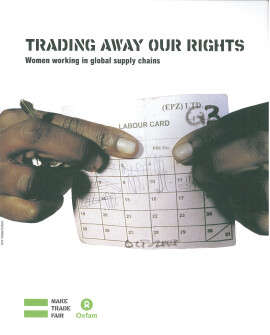
Trading Away Our Rights
Globalisation and trade have drawn millions of women in developing countries into paid work. Their labour is contributing to rising global prosperity and the profits of some of the world's most powerful companies. But women workers are systematically being denied their fair share of the benefits from their labour. Failure to address this injustice will perpetuate a model of globalisation that is failing poor people. This report reveals the double standards at the heart of the corporate practices that are emerging under globalisation. Companies' demands for faster, more flexible, and cheaper production in their supply chains are undermining the very labour standards that they claim to be promoting. Women workers - and their families - pay the price. Many face insecure contracts, intense production pressure, and intimidation in the workplace. Governments, competing to attract investment and boost exports, have too often exacerbated the problem. Instead of strengthening protection for labour rights, they have simply traded them away.
Published: 2004
Pages: 112
Paperback: 9780855985233
| Summary | |||
|---|---|---|---|
| Introduction | |||
| 1. Employed, yes - but precariously | |||
| Facing precarious employment | |||
| Hidden costs beyond the workplace | |||
| 2. Squeezed down the supply chain | |||
| The rise of global sourcing companies | |||
| Employers' strategies down the chain | |||
| Governments' strategies on labour laws and practices | |||
| 3. Clothing the world | |||
| Worldwide manufacturers face retailer and brand power | |||
| Hemmed in: pressure down the supply chain | |||
| Factory managers: passing it on the workers | |||
| 4. Injustices in the fields | |||
| Worldwide growers face supermarket superpowers | |||
| Freshly squeezed: pressure down the supply chain | |||
| Farm managers: passing it on to workers | |||
| 5. Making trade work for women as workers | |||
| Recommendations | |||
| Appendix | |||
| Notes |





